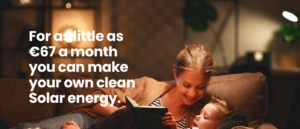 Dublin, Ireland, April 21, 2020 – The latest SEAI report finds Ireland is not on track to meet any of its 2020 renewable energy targets, ranking 27 out of 28 in the EU. Focus is now shifting to Ireland’s 2030 target of 70% of electricity to come from renewables and a zero-carbon electricity system by 2040. Irish start-up SolarShare has a solution to help Ireland meet these targets and is now more focussed than ever to build 1GW of solar generation capacity on homeowner rooftops, creating thousands of jobs, while at the same time delivering a greater than 10% return on investment to homeowners.
Dublin, Ireland, April 21, 2020 – The latest SEAI report finds Ireland is not on track to meet any of its 2020 renewable energy targets, ranking 27 out of 28 in the EU. Focus is now shifting to Ireland’s 2030 target of 70% of electricity to come from renewables and a zero-carbon electricity system by 2040. Irish start-up SolarShare has a solution to help Ireland meet these targets and is now more focussed than ever to build 1GW of solar generation capacity on homeowner rooftops, creating thousands of jobs, while at the same time delivering a greater than 10% return on investment to homeowners.
Now that working from home is the new norm, and with Electric Vehicles becoming mainstream, the average Irish home is likely to consume in excess of 5MWh per annum. With a 4kWh solar system and a 5kWh battery, an Irish homeowner can produce up to 70% of their annual electricity needs. A homeowner reducing their grid electricity by 70% reduces their carbon emissions by about 1.2 tons per annum, or around 10%. That’s a small percentage of the 60m tons of Green House Gases that Ireland generates each year, but it’s the first step on the journey to zero carbon living, which every citizen needs to take. More importantly, homeowners can make this impact starting in 2020. And if there is only one lesson to learn from Covid-19, it is that early action is essential.
Virtual Power Plant (VPP) technology allows homeowners to pool together domestic batteries, and eventually EVs and electric heating, and, as a collective, provide balancing services to the grid operator. This is a component of the vision spelled out in the Irish government’s 2015 Energy White Paper, which states ‘The transition to a low carbon future… will see the energy system change from one that is almost exclusively Government and utility led, to one where citizens and communities will increasingly be participants in renewable energy generation, distribution and energy efficiency.’ Moreover, a VPP enables homeowners to make a contribution to grid resilience and stability, potentially reducing the overall investment required to upgrade the Irish electricity network.
Installing 250k domestic solar systems requires about one million man-days of labour. To accomplish this goal over the next 5 years, SolarShare aims to grow the business to 300 installations/day. Such ambition will generate high-value work for over a thousand skilled tradespeople, a helpful boost to the economy at a critical time. For reference, the UK installed over 600k domestic solar systems between 2010 and 2014.
Installing a 4kWh domestic solar system is an investment of c€9k, after the current SEAI grant. By installing solar, homeowners start generating their own electricity immediately, thereby saving on the amount normally paid to their electricity provider, a saving of approximately €640 per year. Additional savings can be made by filling the battery at night on a cheaper tariff, as well as earning from the sale of excess electricity generated but not consumed, and by participating in the balancing market. Based on today’s prices, SolarShare estimates the additional revenue could represent as much as €180 per year. Carbon Tax, forecast to increase from €20/ton to €80/ton by 2030, can also be avoided. All in all, a home capable of generating 70% of its own electricity can save over €900 per year — indeed a very attractive tax-free return of over 10%.
While paying up front isn’t an option for many Irish homeowners, SolarShare aims to work with credit institutions to increase the range of green finance options. A €9k green loan repaid over 7 years at a 6.5%, will cost the homeowner €75 per month for the period of the loan, but will save the homeowner over €15k over the 20-year life of their solar system, including the cost of replacing the battery with the latest technology after 10 years. Repayments on a green loan spanning 10 years would equal the savings, allowing every homeowner to move to solar without feeling any financial impact whatsoever.
While the Irish government, Eirgrid and ESB Networks work diligently to implement the steps laid out in the Climate Action Plan, SolarShare believes many homeowners want to do their part but simply don’t know how to make a real impact. The 2020 Sign of the Times survey by Behaviour & Attitudes, published recently in The Irish Times points out that ‘the average individual is somewhat bamboozled as to what exactly they should be doing to help stave off the effects of climate change’ and to that end, SolarShare has designed a virtual roof demo, where every homeowner can become informed of the generation capacity of their own rooftop, and the expected carbon savings and financial return on investment for their effort and contribution.
Richard O’Rourke, founder of SolarShare, believes the timing couldn’t be better for thousands of homeowners in Ireland to go solar. “In the post Covid-19 era, it’s clear people will be spending a lot more time at home, so the economics of installing solar are even more attractive than ever before. And as Irish society moves into the recovery phase, it’s critical that we invest now to mitigate climate risks. This is a real opportunity for Ireland to demonstrate how to come out of the current crisis stronger and more resilient.”
